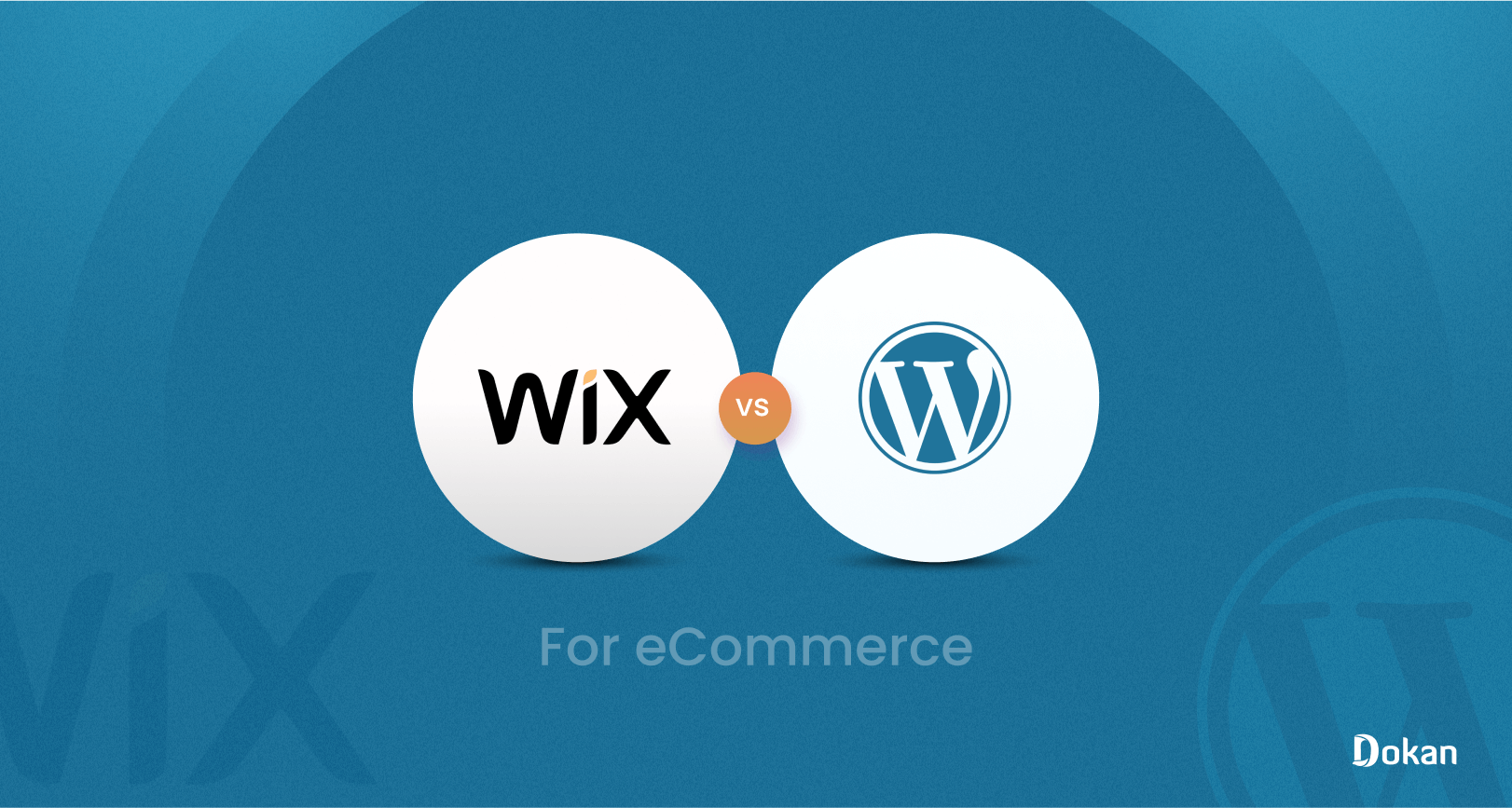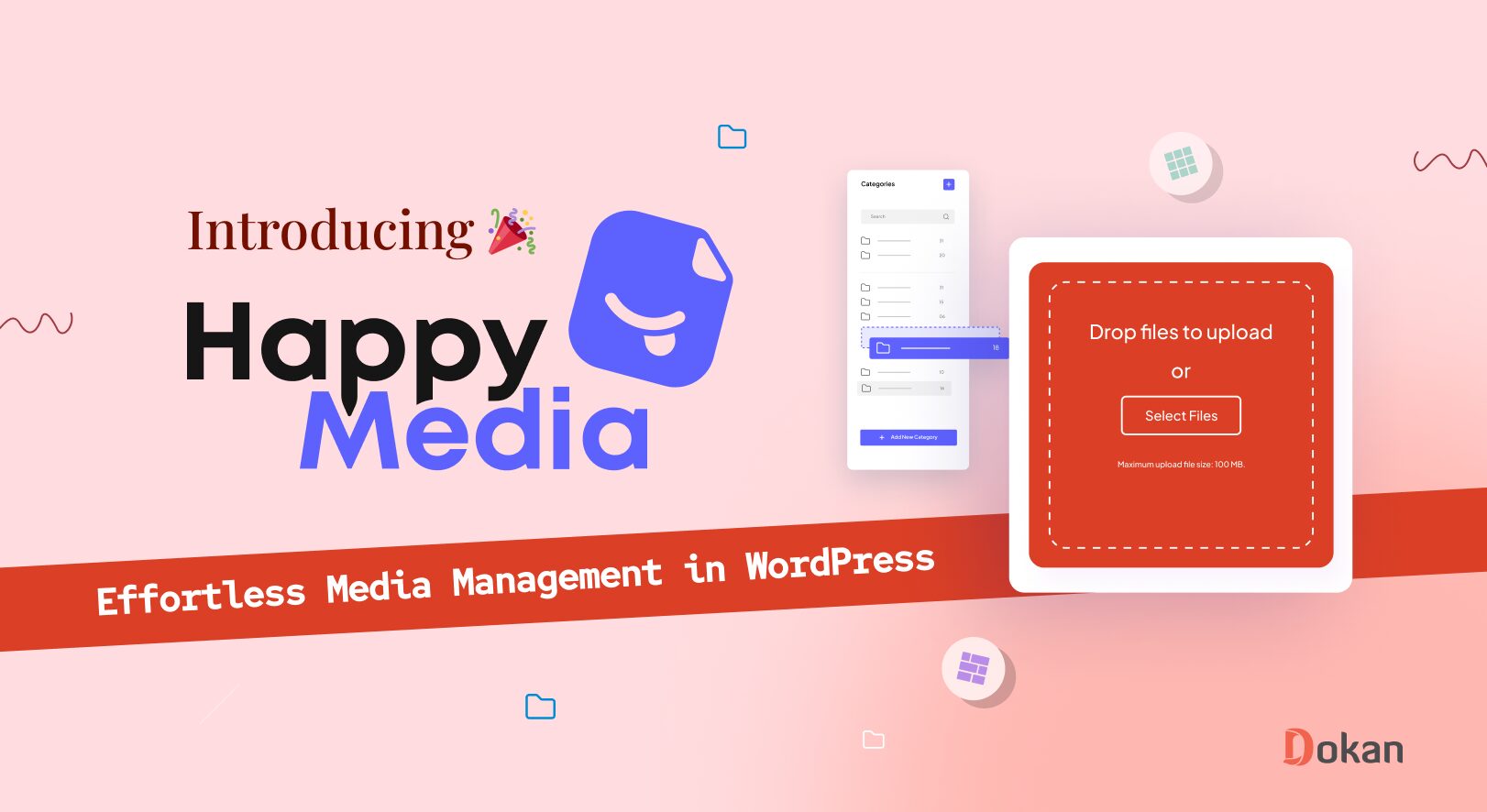For beginners who are looking to start their eCommerce journey, there are quite a few Content Management Systems (CMS) in the industry. These CMS platforms make the task of creating an eCommerce store easy.
Among the countless CMS platforms, WordPress and Wix are two of the best CMS platforms out there and we are going to make a detailed Wix vs WordPress for eCommerce comparison.
WordPress started out as a blogging platform back in 2003 by Matthew Charles Mullenweg and has slowly become one of the best CMS platforms to create any website. With its amazing functions, you can turn your WordPress site into an eCommerce platform.
Wix started its journey shortly after WordPress back in 2006 by Israeli developers Avishai Abrahami, Nadav Abrahami, and Giora Kaplan. It has now become a leader in website creation.
Today we will dig deep and find all the differences between WordPress and Wix and help you choose the best one for your dream online store.
Let’s start with-
Wix vs WordPress: Short Overview
Before we go into the features and functionalities, let’s get a short overview of both platforms. Starting with-
What is Wix?
Wix is a cloud-based website builder that includes web hosting and design services. It gives you the creative freedom to build the website you desire. You don’t need to hire any developer or have any coding skills to create your online store.
The current market share of Wix is 3.6%, behind WordPress and Shopify. In terms of website builders, Wix is the leader and captures 44% of the market share. Based on the data from WIx, there are currently 238 million Wix users and 6 million premium subscribers.
What is WordPress?
WordPress is an open-source CMS that helps users write, publish and manage a lot of content. You can variety of websites including blogs, e-commerce stores, business websites, and portfolios. It is easy to manage, even for users with no coding experience.
The current market share of WordPress is 43.2%, making it the biggest CMS platform in the world. If we look at websites that are created with CMSs, that number is even higher: 63.1% of websites built with an identifiable content management system, are currently using WordPress!
If we look at the current Google trends, it is estimated that 673,000 people in the USA search using the term Wix every day. Whereas 301,000 people search for WordPress.
Wix vs WordPress for eCommerce: Key Features, Similarities & Differences

Both Wix and WordPress are big players in the eCommerce industry. Both are appreciated by the users. However, there are a few differences along with some similarities in their functions and functionalities.
Here are the points we are going to cover-
- Ease of Use and Interface
- Design and Personlization
- Apps and Extensions
- Shipping
- Tax
- Payment Gateways
- Security & Backup
- Product & Order Management
- Marketing & SEO
- Help and Support
- Pricing
Let’s start with-
Ease of Use and Interface
Let’s talk about how easy it is to use both of the platforms.
Wix
Wix is a “what you see, what you get” platform. You will get asked a few questions when you sign up as an eCommerce store owner. First, it will ask what type of online store you are trying to build and suggest a few templates based on your choice.
Then you will be redirected to the dashboard, where you need to answer a few other questions including what type of products you are selling. You can choose all or skip these steps.
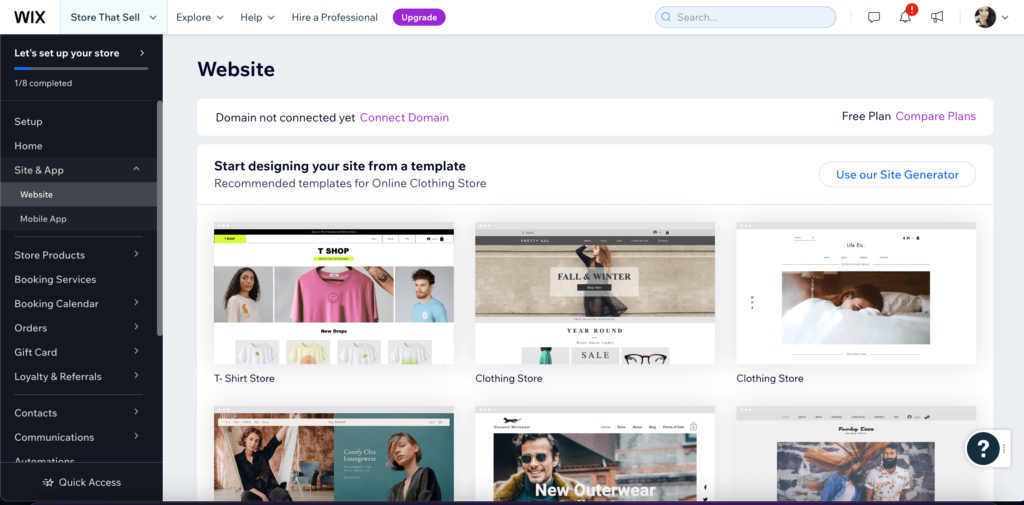
You can use its drag-and-drop feature to create paragraphs, pictures, slideshows, shopping cart buttons, and more anywhere on your web pages. You can also resize anything in a few simple clicks. Or you can let Wix create your website for you.
The onboarding of Wix is very smooth and easy for beginners. However, the dashboard is somewhat complicated and cluttered.
WordPress
With Wix, you can sign up and get started with creating your online store, but with WordPress, you need some preliminary steps. You need to get your own domain and hosting. However, with most of the hostings, you can get WordPress installed with only one or a few clicks.
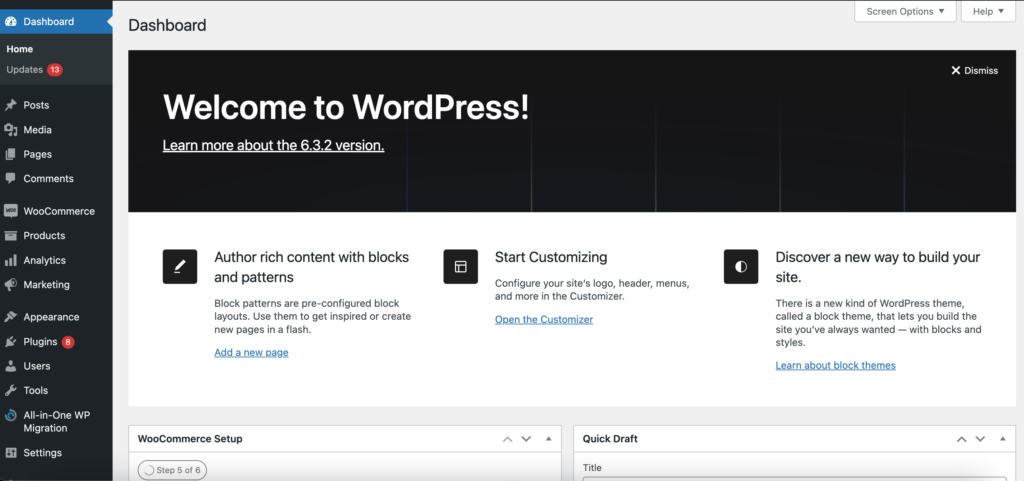
After installing WordPress, you will get a dashboard. From the dashboard, you can install plugins like WooCommerce, which gives WordPress eCommerce functionalities. Also, you can install a theme that will give your online store a professional look.
You can manage the menus and widgets from the dashboard.
Design and Personlization
Both Wix and WordPress have templates and themes that help give users a professional look to their online store.
Wix
Wix gives plenty of freedom to the beginners. There are over 800 templates to choose from, which come free with your Wix plan. The templates are categorized for different industries. Or you can use the Wix builder to publish your site quickly.

The templates are quite beautiful and there are plenty of opportunities for beginners to customize the templates. However, mid to expert-level designers will find them limiting.
If you don’t have the time to design your website then you can use Wix ADI to assist you in creating your website for you. It will simply ask a few questions about the site’s purpose and your design preference. Then it will design your website. However, it doesn’t have many editing tools to customize your website after designing.
Apps and Extensions of Wix
There are more than 300+ apps in the Wix App Store. These apps will enable you to add advanced functionalities like Booking, Auctions, Gaming coupons, Social Media Feeds, SEO, Analytics, etc.
Moreover, managing the apps is easy with the Wix editor. You will find quick-access links from the dashboard. The Apps are vetted by Wix before being introduced in the app store and you don’t need to worry about integration with your online store.
The number of apps seems small, but that is because Wix believes in quality over quantity.
WordPress
WordPress is the land of endless customization. It gives you a blank canvas, so you can design your website any way you like. However, it might become complicated to design when a blank canvas is given to you if you are not sure how your website should look.
But, WordPress backs it up with it free and premium themes. There are thousands of themes available in the WordPress repository and they are organized categorically. You just need to write the term (in your case “eCommerce”) and you can choose from all the beautiful themes available.
Or you can even hire a developer to create a custom theme. But you may not need it as there are more than 2200+ eCommerce themes available to download and purchase.
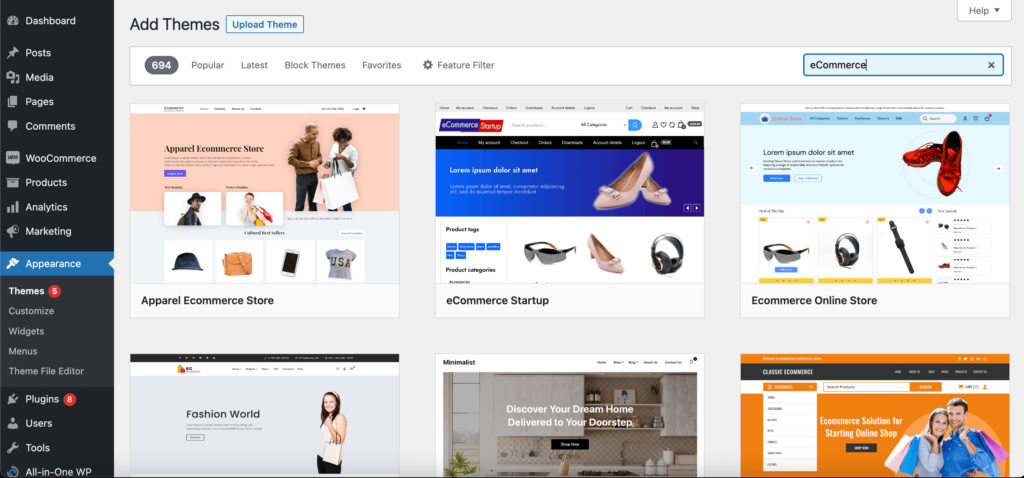
Other than there are quite a few page builders available for WordPress. You can use page builders like Elementor, Divi, Oxygen, and Gutenberg to design and customize your online store.
Plugins and Extensions of WordPress
As we already said, you can use the WooCommerce plugin to turn your WordPress website into an eCommerce store. You can also use the Easy Digital Downloads to add eCommerce functionalities to WordPress. But we are going to emphasize WooCommerce.
Other than that, there are more plugins (60000+) available in the WordPress repository that you can use to enhance your online store.
You will find plugins for SEO, Booking, Auctions, Analytics, Shipping, Subscriptions, etc. So you can create any type of eCommerce store you like. The good news is that WooCommerce itself offers extensions for those features. However, they are not free.
Managing the plugins is easy and you can install them from the WordPress dashboard itself.
Shipping
Shipping is an important part of any eCommerce store. If you are selling physical goods then you need to have a shipping feature on your online store. Wix and WordPress both have extensive shipping features.
So we will discuss the shipping options in this Wix vs WordPress for eCommerce comparison.
Wix
You will find the Shipping options of Wix in the dashboard under the settings option. Wix shipping options are quite extensive and they cover mostly everything. You can set shipping by region and there different shipping types.
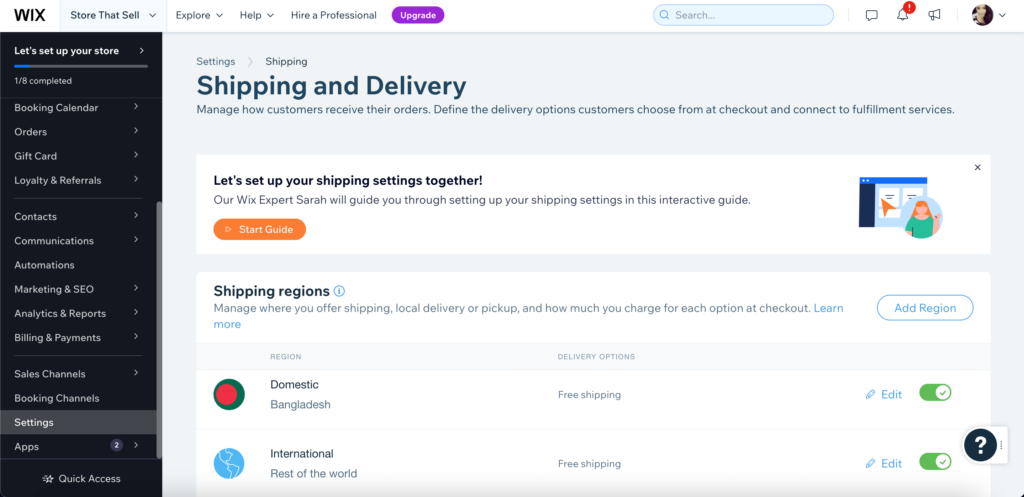
Shipping categories include-
- Flate rate
- Free shipping
- Rate by weight
- Rate by-products
- Rate by price.
Also, you can set up pick-up options and local delivery options as well.
WordPress
In the case of WordPress, its shipping functionalities come from the WooCommmerce plugin. You can easily set the shipping from the WordPress dashboard under the WooCommerce settings options.
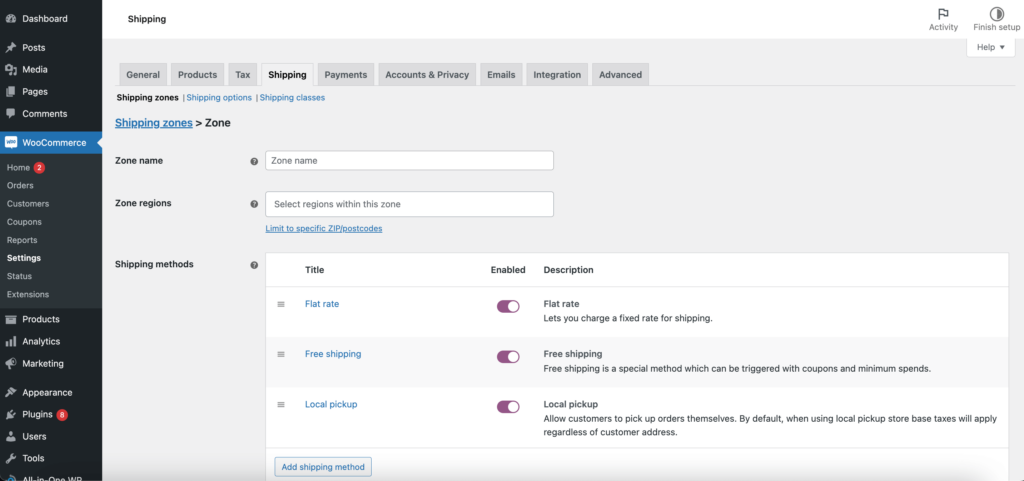
You can set shipping by region and choose different shipping methods for different regions. In the free version of WooCommerce, you can set different shipping types-
- Free shipping
- Flat rate
- Local pickup.
If you want more advanced shipping options then you can install the WooCommerce Table Rate shipping premium extension. It will give you the option to set shipping options based on weight, distance, and products.
Tax
Setting up taxes is a crucial part of any eCommerce store. Without taxes, you will lose a significant amount of profits. Wix and WordPress both offer tax options. let’s see the differences and similarities between these two regarding taxes-
Wix
Wix has an impressive tax feature. As different countries and states have different tax rates, you can add multiple locations and add multiple tax rates. Also, Wix offers-
- Automatic tax calculation: Wix can automatically calculate taxes for US and Canadian businesses based on the customer’s shipping address.
- Manual tax calculation: Wix also allows you to manually calculate taxes for businesses outside of the US and Canada, or for businesses that need to calculate taxes in a more specific way.
- Tax rates: Wix provides a library of pre-configured tax rates, but you can also create your own custom tax rates.
- Tax exemptions: Wix allows you to set up tax exemptions for certain customers or products.
- Tax reports: Wix provides a variety of tax reports that you can use to track your tax liability and file your taxes.
For automatic tax calculation, you need to upgrade to the premium plan of Wix.
WordPress
WordPress eCommerce plugin WooCommerce also has an impressive tax feature. You can add standard tax rates, reduced tax rates, and zero tax rates based on the country and its tax rules. The WooCommerce tax feature includes-
- Automatic tax calculation: WooCommerce can automatically calculate taxes for US and Canadian businesses based on the customer’s shipping address, using the WooCommerce TaxJar extension.
- Manual tax calculation: WooCommerce also allows you to manually calculate taxes for businesses outside of the US and Canada, or for businesses that need to calculate taxes in a more specific way.
- Tax rates: WooCommerce does not provide a library of pre-configured tax rates, so you need to create your own custom tax rates.
- Tax exemptions: WooCommerce allows you to set up tax exemptions for certain customers or products.
- Tax reports: WooCommerce does not provide a built-in tax reporting feature, but you can use several third-party plugins to generate tax reports.
Payment Gateways
Payment gateways are important for accepting payments from customers. Usually, eCommerce stores accept both offline and online payments depending on the location.
Wix and WordPress both offer integrations with different types of payment gateways. We are going to look into that-
Wix
Wix Payments is Wix’s very own payment provider. It allows you to accept credit card payments and various other methods such as Apple Pay, Google Pay, iDEAL, Pay Now by Klarna, or Giropay, depending on your location. You can accept payments from all major credit cards: Visa, Mastercard, Discover, AMEX, Diners, CUP, JCB and Maestro.
Also, you can accept-
- Manual payments
- Cash Payments
- Offline payment
- Cash on delivery.
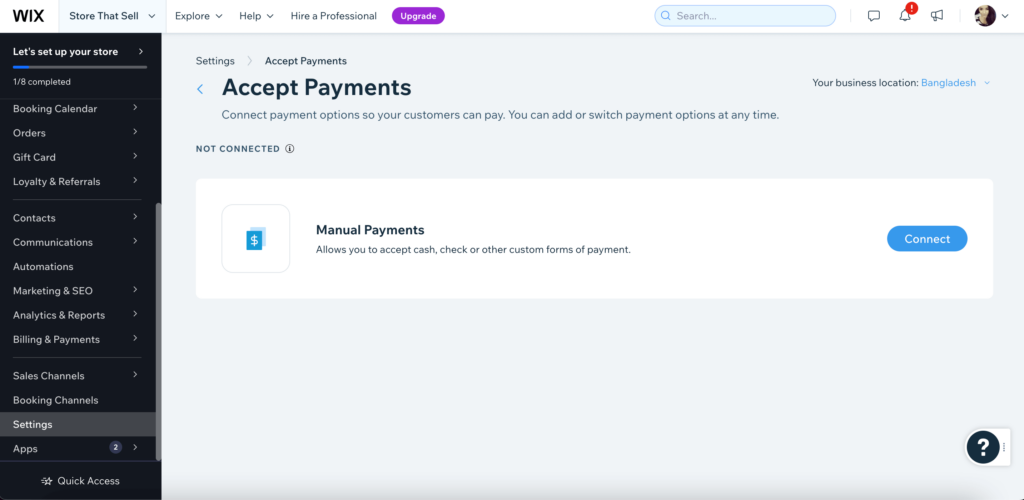
The payment gateways are quite easy to integrate.
WordPress
WordPress, especially WooCommerce has integration with all the major payment gateways including, Paypal, Stripe, Wirecard, Google Pay, Apple Pay, etc. You can install the WooCommerce Paymnets plugin to accept credit cards, debit cards, and other popular payment methods.
You can also configure it to accept-
- Check payments
- Cash on delivery
- Direct bank transfer.
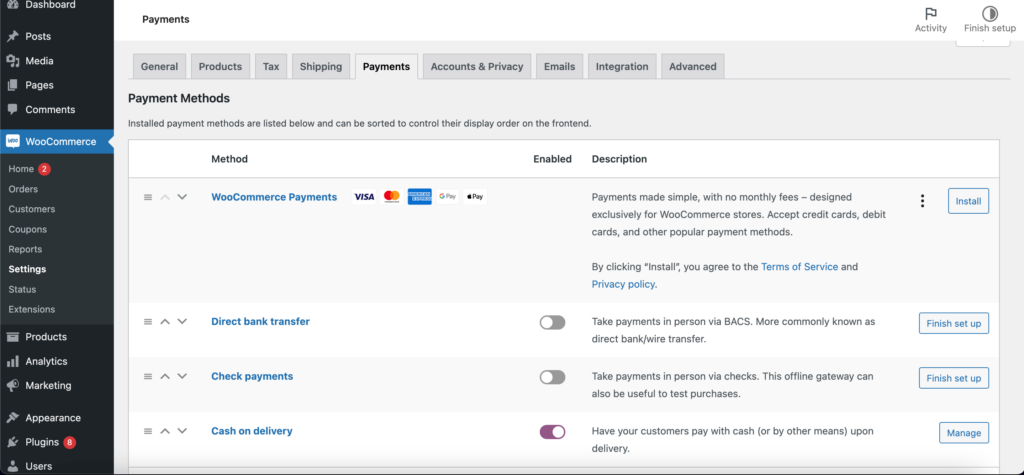
You will find documentation that will help you easily integrate the payment gateways with your online store.
Security & Backup
As an eCommerce store, it is very important to have good security. Because you are handling customers’ sensitive information like credit card data and personal details. That is why Wix and WordPress both are very serious about security.
Also, as you are running a website, it is very normal to run into issues like site breaking, server issues, etc. For that, you need to have a strong backup option.
Wix
Wix is a hosted platform, so you don’t need to add any additional software for security. As users can’t edit the core Wix software, they can’t create vulnerabilities. The platform performs automatic updates, that prevent your site from running outdated software.
Also, DDOS monitoring, 2 step verification are also available in Wix.
Wix has a built-in feature called Site History that automatically saves up to 30 versions of your site every time you publish or save your changes. You can access your Site History from your site’s dashboard, under Settings > Site History. There, you can see the date and time of each backup, preview how your site looked like, and restore any backup you want.
WordPress
WordPress is an open-source platform, so it is more exposed to vulnerabilities. WordPress faces attacks at an average of 90,000 attacks per minute. However, the WordPress core team releases security patches with every new update. You have to implement these patches.
Also, there are quite a few security plugins in the WordPress repository that will help you keep your site safe. You can use plugins like Wordfence, Security Ninja, Ithemes Security, etc to keep your site safe.

On the other hand, there is no built-in function for backup in WordPress. But then again you can use plugins like Updraftplus, Sucuri, etc to keep a backup of your website. These plugins are free, but you need to buy the premium version to enable more advanced features.
Product & Order Management
Managing products and orders is very crucial for any eCommerce store. If admins face trouble while uploading a product then it will certainly annoy them.
Wix and WordPress both have amazing product and order management systems.
Wix
Wix has a very initiative and user-friendly product uploading system. You can add one or more product images, product info, additional info sections, pricing set, custom text, additional product options like variations, inventory and shipping, etc.
The product upload dashboard is very beautiful and gives you a premium feel.
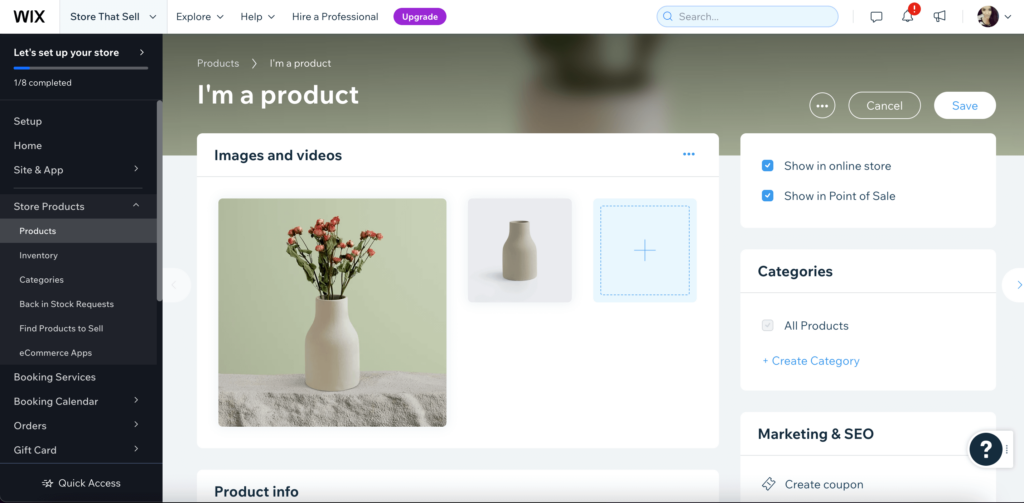
The order management is also very user-friendly. You can customize what you see in the Order tab to suit each task and then save your view to access it quickly the next time you need it. Also, you can filter the order tab, and customize the column in the order tab as well.
WordPress
WordPress’s order management, or rather WooCommerce’s product management is very handy as well. You will get all the options like product images, product info, additional info sections, pricing set, custom text, additional product options like variations, etc.
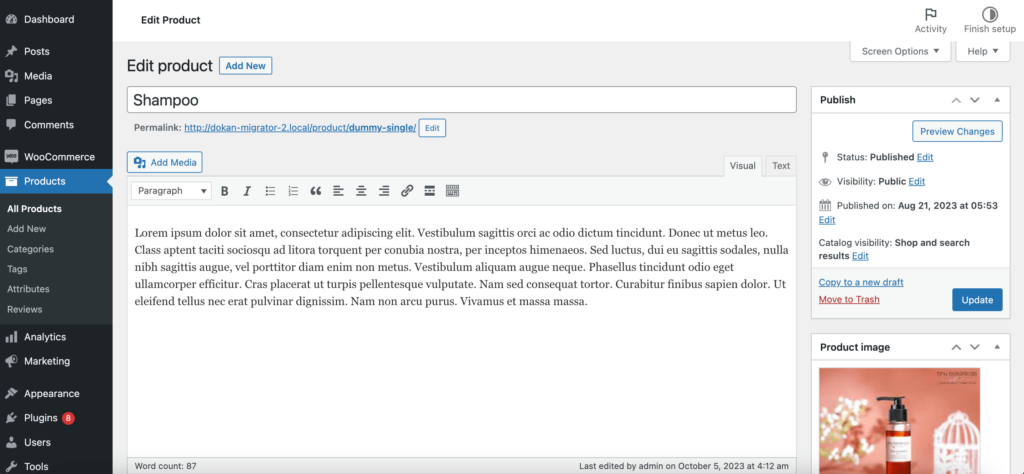
Also, the order management system is very user-friendly as well. You can filter the orders and use the screen options to customize what you want to see in the order section. You will be able to see the timestamp and order delivery details for every single order.
Marketing & SEO
In order to promote your eCommerce store and get search engines to notice your site, marketing, and SEO is very crucial.
Wix has built-in SEO and marketing tools, while you will need plugins for WordPress.
Wix
As we said, Wix has built-in SEO and marketing tools. You will find custom meta tags, social sharing optimization, and robots.txt support. Also, it connects with Google Analytics and Google My Business, which is handy for business websites wanting to boost their local SEO.
Moreover, it has built-in marketing tools, You can easily share your product info through email campaigns, social posts, and Facebook, and Instagram ads. You will find the option under every product edit section.
WordPress
It would help if you used WordPress SEO plugins to optimize your online store for SEO. But the good news is, that you can get all the necessary options for SEO in the free version of those plugins. You can plugins like Yoast SEO, Rankmath, ALL in One SEO, etc to add SEO functionalities to your online store.
Also, there are quite a few social media plugins, and email plugins available that will help you promote your site. Social media plugins and email plugins will both have the feature to schedule your posts. So you don’t need to worry about manually scheduling your every post.
Help and Support
Although you don’t need significant coding or technical knowledge to run both of these platforms, still, you will still need some assistance to get started and help you along the way.
Wix and WordPress both excel in that segment.
Wix
Regardless of the plan you choose, Wix is ready to help you 24/7. Another way to troubleshoot issues is to read comprehensive tutorials in the Wix Help Center. This knowledge base covers every aspect of the drag-and-drop builder, including addressing technical issues and enhancing your website’s performance.
WordPress
WordPress provides support through documentation, tutorials, and forums. Additionally, many premium themes and plugins offer customer support for product-related issues.
When encountering complex problems, you can contact your hosting provider for assistance.
Pricing
We will talk about the pricing in this WordPress vs Wix comparison.
Wix
Wix has a free plan. Its free plan includes hosting, 500 MB of storage and bandwidth, and basic customer support. Other premium plans include-
- The basic plan starts from $4.50/ month
- The combo plan starts from $8.50/ month
- The unlimited plan starts from $12.50/ month
- The VIP plan starts from $24.50/ month.
WordPress
The WordPress core software is FREE to download. However, you need to pay for a domain, hosting, and SSL certificate. However, you will find that most hosting providers will have a bundle these features into one plan.
We will give you a detailed overview of how much it costs to create an eCommerce with both Wix and WordPress later in the article.
Cost of Creating an eCommerce Site: Wix vs WordPress
Here is the cost of creating an eCommerce website with both Wix and WordPress-
| Feature | Wix | WordPress |
|---|---|---|
| Platform fee | Free to start, basic plans start at $8.50/month | Free and open-source |
| Development & Customizations | Can range from $500 to $3,000 depending on the complexity of the website | Can range from $500 to $10,000 depending on the complexity of the website |
| Domain and Hosting | Can range from $10 to $50 per year | Can range from $5 to $50 per month depending on the hosting provider and plan |
Summary: Wix vs WordPress for eCommerce
Here is a detailed summary of Wix vs WordPress for eCommerce-
| Category | Wix | WordPress |
|---|---|---|
| Ease of use | Easier to use, especially for beginners | More difficult to learn, but more powerful and flexible |
| Cost | Paid plans starting at $14 per month | Free, but you will need to pay for hosting and a domain name |
| Customization | Relatively customizable, but not as much as WordPress | Highly customizable, with thousands of free and paid themes and plugins available |
| eCommerce features | Includes product management, secure payment processing, and shipping integration | 1. Businesses of all sizes 2. Businesses that need a lot of customization options 3. Businesses that sell a wide range of products or services 4. Businesses that need advanced SEO or marketing features 5. eCommerce businesses 6. Businesses that sell physical products 7. Businesses that sell digital products 8. Businesses that need a complex or custom website |
| SEO & Security | Good SEO features, but not as many advanced options as WordPress. Secure platform, with regular security updates | Excellent SEO features, with a wide range of plugins and extensions available Secure platform, but you will need to make sure your hosting provider is also secure |
| Support | Good customer support | Excellent community support, with a wide range of tutorials and resources available |
| Marketing | Good blogging features, but not as many advanced options as WordPress | Excellent blogging features, with a wide range of plugins and extensions available |
| Multilingual | Good multilingual features, but not as many advanced options as WordPress | Excellent multilingual features, with a wide range of plugins and extensions available |
| Performance & Scalability | Good performance, but can become slow for large websites. Good scalability, but not as good as WordPress | Excellent performance, with a variety of optimization options available. Excellent scalability, with the ability to handle large and complex websites |
| Developer Tools | Wix offers fewer developer tools, but it is still possible to develop custom code for Wix websites. | WordPress has more developer tools available, such as a code editor, database access, and FTP support. |
| Support | Good customer support | Excellent community support, with a wide range of tutorials and resources available |
| Good For | 1. Small businesses 2. Businesses that are just starting out 3. Businesses that sell a limited range of products or services 4. Businesses that need a simple and easy-to-use eCommerce platform 5. Businesses that sell digital products, such as e-books, courses, or software 6. Businesses that need a basic website | 1. Businesses of all sizes 2. Businesses that need a lot of customization options 3. Businesses that sell a wide range of products or services 4. Businesses that need advanced SEO or marketing features 5. eCommerce businesses 6. Businesses that sell physical products 7.Businesses that sell digital products 8. Businesses that need a complex or custom website |
| Limitations | Limited flexibility Non-transferable websites Limited monetization options Basic store navigation Slow loading times | Limited functionality out of the box Complexity Security vulnerabilities Performance issues Scalability issues |
| Multivendor Support | Yes | Yes |
Conclusion
So we are at the end of our article on Wix vs WordPress for eCommerce. Now it is time to give our verdict.
You should choose Wix over WordPress if you are looking for-
- User-friendliness
- Reduced cost
- More templates
- Less customization and less hassle,
However, you should go for WordPress instead of Wix if you are looking for-
- More flexibility
- More customization
- More features and integrations
- Scalability.
Check more popular comparison posts on WordPress Vs other eCommerce platforms-
Subscribe to
Dokan blog
We send weekly newsletters, no spam for sure!
